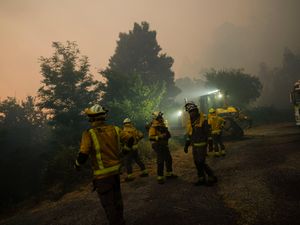Thousands of firefighters across Spain and Portugal are engaged in a relentless battle against a wave of devastating wildfires, with rising temperatures intensifying the crisis across the Iberian Peninsula. These Iberian wildfires pose a significant threat, demanding immediate and coordinated responses from emergency services and military units.
In central Spain, the fight is particularly fierce, with firefighters and a dedicated military unit working tirelessly through the night to bring blazes under control. Their primary focus has been on confining a persistent fire near the village of El Arenal in the province of Avila, situated approximately 100 kilometers west of Madrid.
Simultaneously, Portugal faces similar challenges, as large swathes of both nations remain under a high risk of new fire outbreaks. The volatile combination of dry conditions and strong winds continues to exacerbate the peril, making the firefighting efforts exceptionally arduous for the dedicated teams on the ground.
Meteorological forecasts indicate a worsening situation, with temperatures in central and southern Spain projected to exceed a blistering 40 degrees Celsius by Sunday. This anticipated surge in heat will further complicate suppression operations, creating an even more dangerous environment for emergency personnel tackling the widespread Spain wildfires.
Despite the alarming present conditions and record-high temperatures observed in the region during June, the total surface area burned by Portugal wildfires this year has, fortunately, been less than in previous periods. This resilience, however, offers little solace amidst the current urgent struggle against active conflagrations.
The issue of wildfires extends beyond natural causes, as evidenced by recent developments in Albania, where authorities detained 21 individuals on suspicion of arson. These arrests highlight a troubling aspect of wildfire causation, suggesting that criminal intent can significantly contribute to the scale and frequency of such destructive events, impacting climate emergency responses.
The devastating Iberian heatwave is not merely a localized phenomenon but part of a broader trend of extreme weather patterns impacting Europe. The continuous strain on resources and the environmental damage underscore the urgent need for robust prevention strategies and effective international cooperation in managing these increasingly common disasters.
As the dry season progresses and global temperatures continue to climb, the vulnerability of regions like the Iberian Peninsula to large-scale wildfires remains a critical concern. The resilience and immediate response of thousands of firefighters offer a glimmer of hope, yet the long-term challenge of adapting to a changing climate demands sustained attention and innovative solutions.






Leave a Reply